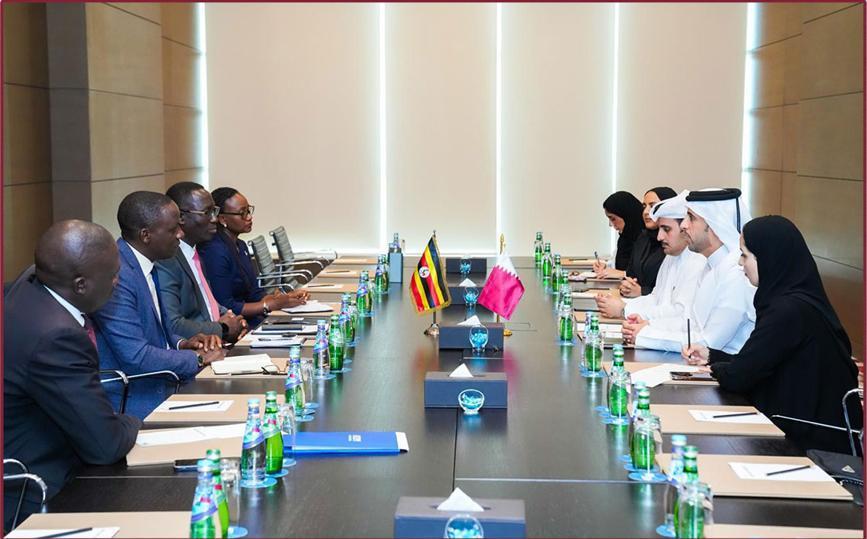By Faridah N Kulumba
Africa-Press – Uganda. Recently Uganda and Qatar’s government authorities discussed strengthening bilateral co-operation in the field of labour. The discussions were held between the Assistant Undersecretary for Migrant Labour Affairs Hamad Faraj Dalmouk, and Uganda’s Permanent Secretary of the Ministry of Gender, Labour and Social Development Aggrey David Kibenge. This was during a regional workshop convened by the International Organisation for Migration (IOM) Regional Office for East and Southern Africa, titled “Knowledge Exchange and Consular Cooperation Workshop.”
Focus of discussions
The discussions spanned a wide array of topics, including contractual frameworks governing labour in the Gulf, wage protection, working conditions, and the legal and administrative challenges of providing consular assistance during recruitment and deployment.The workshop also highlighted the contribution of migrant associations and civil society organisations as key partners in advancing fair and safe migration. Dalmouk emphasised the workshop’s importance as a regional platform bringing together representatives of labour and foreign ministries, consular officials, and civil society actors.
Objectives
According to Qatar, such exchanges offer an invaluable opportunity to share practical experiences and to deepen partnerships in the field of migration governance. Qatar’s minister of labour further noted that the workshop reflects the enduring partnership between Qatar and the UN Migration Agency and underscores the Ministry of Labour’s central role in shaping labour policies, promoting fairness in the labour market, and fostering a leading model for safeguarding workers’ rights and ensuring decent and safe working environments.
Cooperation benefits
Dalmouk reaffirmed Qatar’s commitment to working closely with regional and international partners to strengthen cooperative frameworks and exchange best practices. He emphasised that these joint efforts are crucial to reconciling the needs of labour markets with the protection of workers’ rights, thereby translating shared aspirations into concrete policies and tangible outcomes.In April 2024, the governments of the State of Qatar and Uganda inked an agreement to enhance joint cooperation in the fields of labour and organize labour recruitment from the Uganda. It aimed to enhance the strategy of the Ministry of Labor in attracting skilled and qualified labour and bolstering their presence in the local market, improving the productivity of the private sector, and upgrading the work environment.
According to the agreement, the two governments agreed to facilitate the procedures for recruiting skilled labour from the Republic of Uganda and supply the local market with the required competencies, qualifications, experiences, and specializations. Both parties also agreed to review job opportunities available in the State of Qatar and the skills and experiences required, and their availability in Uganda.The Uganda-Qatar Bilateral Labour Agreement is a significant stride towards safeguarding the rights and welfare of migrant workers. It embodies a shared responsibility towards humanity’s most vulnerable and sets a commendable standard for international labour agreements.This agreement is not just a beacon of hope for Ugandan workers; it’s a call to action for nations worldwide to reevaluate and improve their labour practices in favour of human dignity and rights
In May, the president of the Republic of Uganda Yoweri Kaguta Museveni held a meeting with a prominent investor from Qatar, Mr. Khalid bin Mohammad Al Attiyah also a former Deputy Prime Minister of Qatar to discuss investment cooperation between the two nations. The discussions centred around deepening bilateral investment cooperation, with a focus on key sectors including petroleum supply infrastructure, mining and agriculture. President Museveni took the opportunity of the meeting to present proposals aimed at value addition in Uganda’s agricultural sector, particularly in coffee and fruit processing, to enhance export competitiveness. Museveni also proposed collaboration in the mining sector, specifically in the processing of lithium, a strategic mineral necessary for clean energy technology.
The two countries partnership
In the past years Qatar and the Republic of Uganda signed several Memorandums of Understanding (MoU) aiming to enhance bilateral cooperation in several fields, including a cooperation agreement in the field of defence; a cooperation agreement on encouraging and protecting mutual investments; an agreement on economic, trade, and technical cooperation, and an MoU on cooperating in the field of agriculture.
On 3rd November e 2024, Uganda’s Chief of Defence Forces (CDF), General Muhoozi Kainerugaba, arrived in Qatar on a diplomatic visit aimed at strengthening military ties and collaboration between the two countries. Gen Muhoozi, also Senior Presidential Advisor for Special Operations, was invited by the Qatari Armed Forces. The meeting between Uganda and Qatar’s top military officials aimed to operationalize the relationship established through the 2017 military cooperation agreement signed between the Uganda People’s Defence Forces (UPDF) and the Qatar Armed Forces. The agreement focused on key areas such as training, intelligence sharing, and counter-terrorism efforts. In April 2017, Qatar and the Republic of Uganda signed several Memorandums of Understanding (MoU) aiming to enhance bilateral cooperation in several fields. The signing of the MoUs happened during a diplomatic meeting between President Museveni and Emir H Sheikh Tamim bin Hamad Al Thani, which was held at the Emiri Diwan.
For More News And Analysis About Uganda Follow Africa-Press






